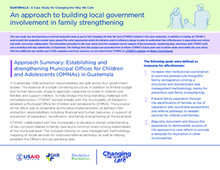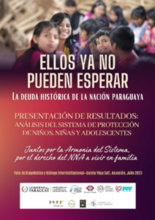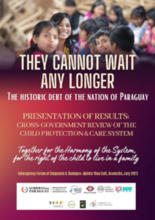This page contains documents and other resources related to children's care in the Americas. Browse resources by region, country, or category.
Displaying 191 - 200 of 3180
This case study, part of the five-year evaluation of the Changing the Way We Care (CTWWC) initiative, examines efforts in Guatemala to strengthen child and family protection through local government engagement.
The Biden administration announced a mix of final and proposed rules on child welfare policy today that cover the placement of foster youth with relatives, legal representation for parents and children involved with the system, and the placement of LGBTQI+ youth in foster care.
On 21st September 2023, the Governments of Canada and Zambia, in partnership with UNFPA-UNICEF Global Programme to End Child Marriage and the Child Marriage Monitoring Mechanism, hosted a High-Level Side Event during the Seventy-Eighth Session of the United Nations General Assembly. The event was titled 'Charting Brighter Futures: Utilizing Data for Accelerated Action to End Child Marriage and Achieve SDG 5.3'.
Given the recent Supreme Court ruling on the Indian Child Welfare Act (ICWA), it is crucial to emphasize the importance of protecting and strengthening ICWA in light of the disproportionate representation of Native American children in the foster care system.
A pesar de que la Análisis Nacional y el plan de acción transversal fueron aprobados por la Corte Suprema de Justicia y el Consejo Nacional de la Niñez y la Adolescencia a principios de 2020, debido a la pandemia y la emergencia sanitaria nacional declarada en Paraguay, que afectó gravemente al sistema de protección, nuestro gobierno no pudo implementar el plan interinstitucional basado en evidencia para optimizar nuestro sistema, que incluía medidas a corto, mediano y largo plazo como solución a los problemas identificados.
Even though the Cross-Government review and action plan were approved by the Supreme Court of Justice and the National Council for Children early 2020, due to the pandemic and national sanitary emergency declared in Paraguay (affecting the protect
This webinar hosted by the Evidence for Impact Working Group of the Transforming Children’s Care Collaborative will examine the Early Institutionalization Intervention Impact Project in Brazil.
Better Care Network (BCN) is seeking a Community Outreach and Youth Engagement Specialist. The Community Outreach and Youth Engagement Specialist is responsible for ensuring effective information sharing, communication, and engagement of a wide range of stakeholders and partners as part of key inter-agency initiatives which BCN is facilitating, in particular the Transforming Children’s Care Global Collaborative.
the Fiscal & Grant Administrator is responsible for assisting in the overseeing the fiscal and procedural requirements of RPCA grants, including the development of appropriate financial controls and procedures, related procurement needs, working with pre- and post-award sponsored administration, budgeting, and financial reporting and forecasting.
The Refugee Program Manager will inform delivery of mental health and family support needs to resettled refugees in the US. The Refugee Program Manager will engage with local community resettlement agencies and other key stakeholders and partners.




